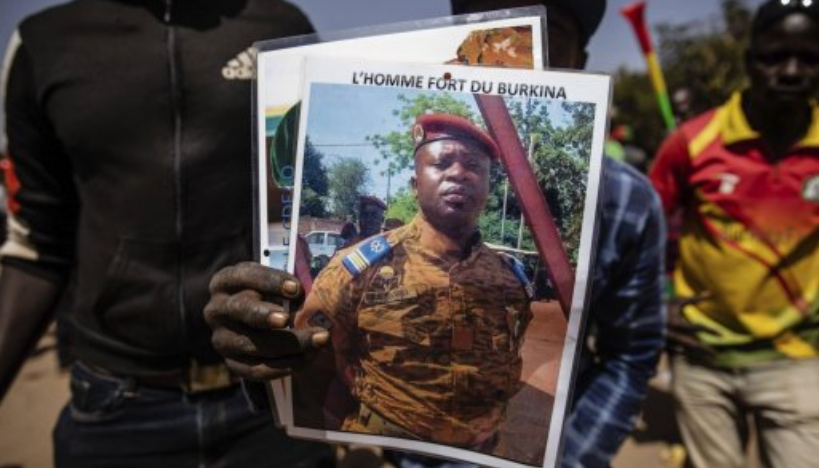By Nadoun Coulibaly
On 24 January, a group of soldiers seized power by overthrowing President Roch Marc Christian Kaboré. The self-proclaimed Mouvement Patriotique pour la Sauvegarde et la Restauration (MPSR) has announced that 41-year-old lieutenant-colonel Paul-Henri Sandaogo Damiba, who has an ‘exemplary’ record, will be taking over as the country’s leader. A profile of the coup leader.
On 25 January, hundreds of people flocked to Ouagadougou’s Place de la Nation to applaud the military putschists. Hundreds of people raised their fists and waved red flags as they made their way to the Place de la République, in the heart of Ouagadougou.
The crowd was cheering for one man, whose name was mentioned at around 5.30pm GMT on Monday, when a group of 14 soldiers stood in front of national television cameras to demand that President Roch Marc Christian Kaboré be removed from power.
The self-proclaimed Mouvement Patriotique pour la Sauvegarde et la Restauration (MPSR) announced that it has taken power and named 41-year-old lieutenant-colonel Paul-Henri Sandaogo Damiba from Koupéla, in the centre part of the country, as head of state. Members of the MPSR assure us that he is already at work, from an office in the General Baba Sy camp: “With his lieutenants, including Commander Victor Tankouano, he is working on structuring the transitional bodies.”
Exasperated by the security situation
His outburst was no accident. According to people close to the head of the junta, Damiba had been preparing to overthrow Kaboré’s regime for weeks, as he was fed up with how the army was being treated and the conditions in which the soldiers were supposed to fight. He had discussed this with his fellow graduates from the Kadiogo military academy, who supported and encouraged him to take action in recent weeks.
On many previous occasions, while on operations in the toughest terrain, he had written letters, alerting his hierarchy. The attack on Inata, during which 53 people were killed, and the revelations surrounding the difficulties faced by the gendarmes posted in this Soum locality were the event of the year.
Damiba is first and foremost a field soldier, as he attended Burkina Faso’s best military schools. “Rigorous”, with an exemplary record of service, he embodies his function so well that his men call him “the army.” Much appreciated by his men, he is described as an honest soldier who only owns a rented house. His only hobby is his passion for big cars.
After training at the Kadiogo military academy, where he entered in 1992, Damiba joined the commando training centre in Pô. He later enlisted in the Régiment de Sécurité Présidentielle (RSP), the best unit in the country, led by Gilbert Diendéré, Blaise Compaoré’s former chief of staff, and then by Isaac Zida, the lieutenant-colonel who took over as head of the country in 2014.
Damiba is known for his strong personality. In 2011, disgruntled soldiers took part in mutinies against their hierarchy that shook the country. Damiba’s residence, which was located within the compound of the Conseil de l’Entente, was targeted by a rocket. As a result, the lieutenant-colonel was forced to leave the RSP.
Fighting on the front lines against armed groups
Transferred to Dori, in the north-eastern part of the country, he became commander of the Régiment d’Infanterie Commando (RIC), then took command of the 12th RIC in Ouahigouya and became the head of the anti-terrorist forces on this front. He operates in particular in the Djibo area, fighting on the front lines against armed groups.
Damiba played no role in the 2015 RSP-led coup. He neither supported nor opposed his former comrades. But afterwards, he received further instruction outside the country. He also completed his training at the military school in Paris, joining the 24th class of the École de Guerre in 2017, and at the Conservatoire National des Arts et Métiers (CNAM) in Paris. Finally, he claims to be a certified defence expert in management, command and strategy.
Back in the country, he was promoted to the head of the 30th Régiment de Commandement d’Appui et de Soutien (RCAS) based at Camp General Baba Sy, also known as Camp Boiro, one of the largest in the capital.
At the same time, he was writing an essay entitled “Armées Ouest-Africaines et Terrorisme : Réponses Incertaines?”, which was published in June by Les 3 Colonnes. The book analyses the specifics regarding West African terrorism and criticises the current authorities’ responses. He also recounts his combat experience and the harsh reality of the fight against terrorism.
Very recently, during the reorganisation that followed the attack on Inata on 16 December, he was given command of the largest military region in the country, the 3rd, which covers Ouagadougou, Koudougou, Fada N’Gourma and Manga.
Credit | the africa report

